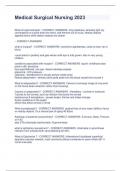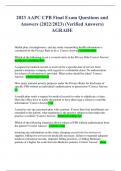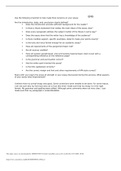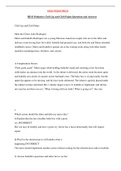Exam (elaborations)
Medical Surgical Nursing 2023 What is hypermetropia? - CORRECT ANSWERS long sitedness, whereby light ray convergence at a point after the retina, and therfore out of focus. Nearby objects apphear blurry while distant objects are clearer - CORRECT ANSWER
- Course
- Institution
Medical Surgical Nursing 2023 What is hypermetropia? - CORRECT ANSWERS long sitedness, whereby light ray convergence at a point after the retina, and therfore out of focus. Nearby objects apphear blurry while distant objects are clearer - CORRECT ANSWERS what is myopia? - CORRECT ANSWERS ne...
[Show more]












